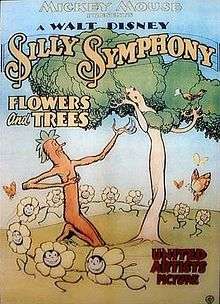Flowers and Trees

Flowers And Trees is a 1932 Silly Symphonies short subject, directed by Burt Gillett. It covers the very basic story of two trees falling in love, only for an ugly, rotten tree to try and wreak havoc with a fire.
Flowers and Trees was already in production as a black and white cartoon before Walt Disney saw Herbert Kalmus' three-strip Technicolor tests. Deciding that Flowers and Trees would make a perfect test for the process, he completely scrapped the black and white footage, and had the short redone in color. As a result, Flowers and Trees was a commercial and critical success, and thus won the first Academy Award for Animated Short Subjects--another step forward to animation becoming a respected medium.
As a result of the success of Flowers and Trees, all future Silly Symphonies cartoons were produced in three-strip Technicolor, and the added novelty of color helped to boost the series' previously disappointing returns. Disney's other cartoon series, the Mickey Mouse shorts, were deemed successful enough not to need the extra boost of color, and therefore remained in black-and-white until 1935's The Band Concert.
Disney's exclusive contract with Technicolor, in effect until the end of 1935, forced other studio imitations of the series, such as Ub Iwerks' ComiColor Cartoons, Warner Bros. Merrie Melodies and Max Fleischer's Color Classics to use Technicolor's inferior two-color process or a competing two-color system such as Cinecolor.
This short is also a runner-up on The 50 Greatest Cartoons list.
- Animation Bump: Besides the added benefit of lush color, the animation is much more polished than the typical Silly Symphony of the time.
- Epic Fail: The evil tree attempting to kill the tree couple via a fire he started, only to get engulfed by his own flames.
- Hoist by His Own Petard / Karmic Death: The evil tree fittingly meets his end when he gets burned alive by the very flames he made.
- Scenery Porn: For the first three-strip color cartoon, they got it started with a bang!
- Standard Snippet / Public Domain Soundtrack: The "Dawn" part of "The William Tell Overture" is heard when the male tree courts the female tree with the worm ring.
- Too Dumb to Live: The main characters, since at one point there's a clear path for the trees to run away from the flames--but instead the male tree tries to put out the flames with his foot.
- When Trees Attack